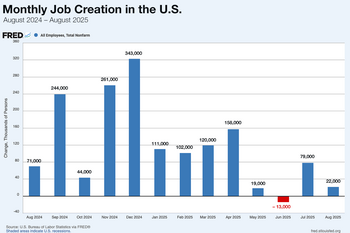
The recent jobs report showing declines in almost all high-wage sectors — notably manufacturing, professional and business services — does not augur well for the durability of the MAGA revolution. Although Trump inherited a weak economy, his policies in the short run seem to have accelerated layoffs without yet sparked hiring.
The numbers are frankly depressing. Manufacturing shed 12,000 jobs, extending a decline that began in February 2023. Wholesale trade also suffered, reflecting exposure to tariff turmoil. High-wage sectors were hit too, with lost jobs likely due less to trade than to the rise of AI. As in the closing years of the Biden administration, job growth is concentrated in low-end services such as retail, healthcare, and food.
Some of the problems lie in timing. Trump’s tariff threats have succeeded in winning huge commitments from major tech and industrial companies. But these developments take years to build, and even longer to become operational. In many ways Trump may suffer the indignity of seeing his positive legacy reaped not by his acolytes, but by the likes of Gavin Newsom.
This seems ironic given that Trump does not seem like a man with a coherent strategy or long-range vision. MAGA is, and will remain, a reactionary movement bent on rolling back progressive policies that reached their extremes during the twilight of the Biden years. Under the climate and social justice regime imposed by the Democrats, the economy could never really expand outside of government services, a reality more associated with Europe than America.
Trump has worked to roll back these trends, to his credit, but this will not be painless. There are vast constituencies — tech companies, financial markets, libertarian ideologues — who would like to see his economic policies fail, so that we can remain a country on an inexorable economic and technological retreat. A country that cannot produce screws can’t overcome one that can.
Sometimes entrenched problems need to be purged, and in this Trump has been effective. His approach to critical issues such as energy production, EV mandates, DEI, and expenditures of dodgy progressive projects, here and abroad, have had some effects. By the time he is finished, Trump may have unraveled much of the regulatory regime that has stifled production and deepened America’s perilous dependence on China.
Read the rest of this piece at: UnHerd.
Joel Kotkin is the author of The Coming of Neo-Feudalism: A Warning to the Global Middle Class. He is the Roger Hobbs Presidential Fellow in Urban Futures at Chapman University and and directs the Center for Demographics and Policy there. He is Senior Research Fellow at the Civitas Institute at the University of Texas in Austin. Learn more at joelkotkin.com and follow him on Twitter @joelkotkin.
Chart credit: U.S. Bureau of Labor Statistics, via FRED, data as of Sept. 8, 2025.












